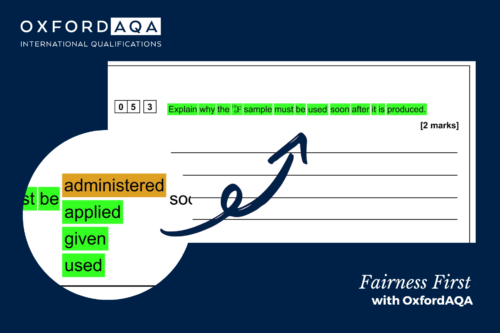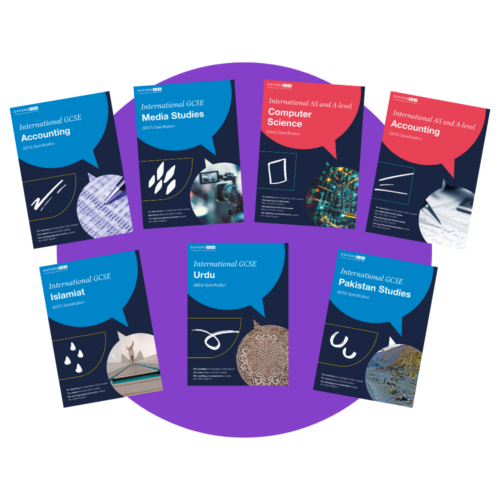
What factors increase student exam stress and what do we do to help?
The exam season is a time that can be filled with stress and anxiety for the young people taking our International GCSE, AS and A-level assessments. The need to revise, the pressure to achieve, and the anticipation of what will face them when they turn over the paper, can all put a strain on student wellbeing.
In addition, the design and content of an exam has the potential to present additional hurdles that bring with them extra stress. For example, if topics are culturally unfamiliar or the language used is unnecessarily challenging for the level of exam, stress levels are likely to rise and students can be placed at an unfair disadvantage.
However, there are many things we do as an international exam board to minimise such stress and ensure all students have fair access to our exams. This article will highlight some of the sources of stress that can impact student wellbeing when sitting an exam.
We will explain what we at OxfordAQA do to make sure our assessments are fair and accessible for all students.
Surprise!
No-one likes surprises, certainly not in an exam.
Including anything unexpected in a question paper is likely to throw students off track. Changes to layout or the use of different question types or unexpected images can all increase the cognitive load placed on students as they try to process unanticipated features.
So to avoid this, our subject specifications aim for consistency in the structure of their papers and the types of questions they ask. Sample materials and past papers are readily available for students and teachers preparing for an exam, to help students understand what they will see when they sit the real thing.
While exams should not be overly predictable, ensuring students are prepared for the possible content and layout that they will be faced with is important for ensuring a fair assessment. If students are clear about what to expect in the exam, it’s one less thing for them to worry about.
Language should help not hinder

The language used in questions and source materials can unintentionally create barriers for learners as they complete an exam paper, adding to the stress of the exam experience.
Using vocabulary that is too demanding for the level of the qualification can lead students to misunderstand content or create anxiety about what is being asked of them.
Complex sentence structures can also take up valuable time in the exam as students try to navigate the meaning.
We use research to inform the way we ask questions and ensure student wellbeing.
For example, research evidence suggests that using vocabulary that is familiar to the reader can increase accessibility and ensure fair access for all learners.
This is particularly pertinent for learners with English as an additional language or learners with learning difficulties, such as dyslexia.
At OxfordAQA, we use a unique tool to ensure that our language is accessible to all learners, the Oxford 3000™.
The length and complexity of sentences is also key. While shorter sentences are sometimes easier to understand, it is the clarity of the information that is important.
We guide writers of questions and exam papers to avoid using overly complex structures and, where possible, to stick to the active (rather than passive) voice.
Sensitive and relevant content
The content used in question papers can have a real impact on how students experience their exam. If culturally insensitive content is included in a question or in the source materials, students may struggle to perform well.
The guidance that we have developed for writing international exams in particular, highlights the need to consider the political, religious and other cultural aspects of the content being used.
Furthermore, if the context used in a question is culturally unfamiliar, research suggests students will find it difficult to engage with the content and may also misinterpret key aspects of the question.
If scenarios are used that not everyone has access to, for example asking students to describe an expensive leisure activity or a natural environment such as the beach, this can create bias towards one group of students and can disadvantage others.

To make sure that students aren’t negatively impacted by an unfamiliar context or inappropriate content we provide clear guidance and training to our item writers.
We also check all papers to make sure that the use of context is not insensitive or introducing biases and subsequent unfairness.
While exams unavoidably bring with them some stress for students, there are a number of ways that we can minimise the anxiety associated with sitting a paper and help protect student wellbeing on the day.
By ensuring that students are prepared for the type of questions and the possible content by providing support to teachers and centres, stressful surprises can be avoided.
The use of clear, accessible language can help all learners access the questions and materials provided. Making sure the content is sensitive to the backgrounds of all learners is also key for providing fair and accessible assessments for all.
Learn more about the science behind fair assessment in education
Our unique Fair Assessment approach is based on three key principles:
- Learn how we design international exams that are valid
- Learn how we ensure that our international exams are reliable
- Learn how we achieve international exams that are comparable



